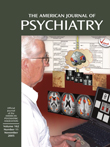Psychiatric Effects of Ephedra: Addiction
To the Editor: I wish to extend my support to Margaret Maglione, M.P.P., et al. (1) for their article. The issue of the safety of dietary supplements, and specifically ephedra alkaloids, has been long problematic but only recently addressed (2). Although psychosis was found to be the most frequent psychiatric adverse event reported in their review of the database of the Food and Drug Administration (FDA), I offer that substance (ephedra) abuse, and sometimes dependence, is a more frequent occurrence in society.
As addressed in their article, this is known to occur (FDA data: 8.6%) but is only rarely reported in the medical literature (3). This may be due, in part, to the possibility that psychosis is highly likely to be recognized as an adverse event by clinicians (whether for FDA reporting or for the purposes of medical literature), but addiction is not—despite its more long-lasting, well-documented, and devastating personal and societal consequences. Moreover, be aware that ephedra products have been aggressively marketed as legal alternatives to illegal stimulants, with some ephedra products testing positive for controlled substances of abuse (4). Thus, these products are perhaps more likely to be consumed by those at risk of developing substance use disorders. Since our original case report was published in Psychosomatics(5), I have encountered two additional cases of ephedra dependence.
My own experience with the FDA’s Internet and telephone-based reporting “portholes” during attempts to report a highly detailed case report of an ephedra addiction/adverse event led only to dead ends and no returned calls, despite three attempts. My best recourse was to publish this case in the medical literature (5). This data input access issue further complicates the FDA’s well-intended data, data that may only represent 1% of the actual adverse event reports in society.
Thus, I hypothesize that ephedra abuse/dependence is a more common adverse event than FDA data indicate, and quite possibly more common than psychosis. Nevertheless, this article summarizing the FDA data and alerting clinicians cannot be overstated in terms of its value and practical worth to psychiatrists and general practitioners. I am very thankful for the authors’ product.
1. Maglione M, Miotto K, Iguchi M, Jungvig L, Morton SC, Shekelle PG: Psychiatric effects of ephedra use: an analysis of Food and Drug Administration reports of adverse events. Am J Psychiatry 2005; 162:189–191Link, Google Scholar
2. Miller SC: Ephedra and FDA (letter). Psychiatr News, April 2, 2004, pp 66, 76Google Scholar
3. Miller SC: Safety concerns regarding ephedrine-type alkaloid-containing dietary supplements. Milit Med 2004; 169:87–93Crossref, Medline, Google Scholar
4. Gurley BJ, Gardner SF, Hubbard MA: Content versus label claims in ephedra-containing dietary supplements. Am J Health Syst Pharm 2000; 57:963–969Crossref, Medline, Google Scholar
5. Miller SC, Waite C: Ephedrine-type alkaloid-containing dietary supplements and substance dependence. Psychosomatics 2003; 44:508–511Crossref, Medline, Google Scholar



